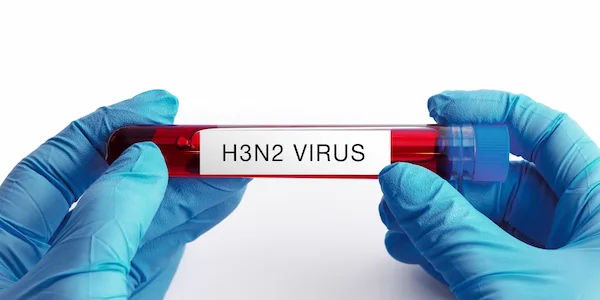Paediatric Cardiology: A Parent's Guide to Children's Heart Health
A comprehensive guide for parents on children's heart health, covering signs, common conditions, diagnosis, treatment, and lifelong care in paediatric cardiology.

Written by Dr. Dhankecha Mayank Dineshbhai
Reviewed by Dr. Siri Nallapu MBBS
Last updated on 13th Jan, 2026

Introduction
As a parent, your child's health is your top priority. The mere thought of a heart problem can be overwhelming. But knowledge is power. The field of paediatric cardiology is dedicated to diagnosing, treating, and managing heart conditions in children, from before birth through adolescence. This guide is designed to demystify this complex medical specialty for you. We will walk you through the signs to watch for, the common conditions, the advanced diagnostic tools available today, and the remarkable treatment options that give children with heart conditions the chance to lead full, active lives. Whether you're seeking reassurance or answers, this comprehensive overview will equip you with the essential information you need to be an informed advocate for your child's cardiovascular health.
What is Paediatric Cardiology?
Paediatric cardiology is a branch of medicine that deals with disorders of the heart in infants, children, and adolescents. It's distinct from adult cardiology because children's hearts are not just smaller versions of adult hearts. They have unique anatomies, face different types of diseases (especially congenital conditions present at birth), and are constantly growing and developing. A paediatric cardiologist is a specialist who undergoes extensive training to understand these complexities.
The Unique Role of a Paediatric Cardiologist
A paediatric cardiologist does more than just treat existing conditions. They are detectives, often diagnosing subtle issues through careful listening and advanced imaging. They are counsellors, guiding families through frightening diagnoses and complex treatment plans. And they are long-term partners in health, managing a child's heart care from infancy into young adulthood, ensuring a smooth transition to adult cardiac care when the time is right. Their expertise covers a wide spectrum, from foetal cardiology (diagnosing heart problems before birth) to managing the long-term health of survivors of childhood heart surgery.
Health topic carousel:
Doctor's speciality: Paediatric Cardiologist
Text: Consult a Paediatric Cardiologist for the best advice
Recognising the Signs: Symptoms of Heart Problems in Children
Early detection is crucial for the successful management of paediatric cardiology conditions. The symptoms can vary dramatically based on the child's age and the specific heart problem.
Symptoms in Babies and Infants
In newborns and infants, who cannot verbalise what they feel, signs are often related to feeding and energy levels. Key symptoms include:
Poor Feeding: Difficulty feeding, tiring easily during feeds, or sweating excessively while feeding.
Fast Breathing (Tachypnoea) or Shortness of Breath: Noticeably rapid breaths even when at rest.
Blue Discolouration (Cyanosis): A bluish tint to the skin, lips, and fingernails, especially during crying or feeding. This indicates low oxygen levels in the blood.
Failure to Thrive: Not gaining weight or growing at the expected rate.
Excessive Sweating: Particularly on the forehead.
If you observe any of these symptoms in your infant persistently, it is important to consult a paediatrician. For immediate concerns, you can consult a doctor online with Apollo24|7 for a preliminary assessment.
Symptoms in Older Children and Adolescents
In older children, symptoms may be more similar to those in adults but are often overlooked or attributed to other causes like lack of fitness. Be alert for:
Easily Tiring: Inability to keep up with peers during physical activities, needing to rest frequently.
Chest Pain or Palpitations: Complaints of a racing, pounding, or fluttering heart.
Fainting Spells (Syncope): Especially during exertion.
Swelling (Oedema): In the legs, abdomen, or around the eyes.
Common Heart Conditions in Children
Understanding the types of conditions treated in paediatric cardiology can help contextualise the symptoms and treatments.
Congenital Heart Defects (CHD)
CHDs are the most common type of birth defect, affecting nearly 1 in 100 babies born. These are structural problems with the heart present at birth.
What are Congenital Heart Defects?
CHDs occur when the heart or blood vessels near the heart don't develop normally before birth. The exact causes of congenital heart defects are often unknown, but a combination of genetic and environmental factors is believed to play a role.
Types of CHD: Cyanotic vs. Acyanotic
CHDs are often categorised based on whether they cause cyanosis.
Acyanotic Defects: The heart has a structural problem, but blood still receives enough oxygen. Examples include ventricular septal defect (VSD - a hole in the heart) and coarctation of the aorta (a narrowing of the aorta).
Cyanotic Defects: The heart defect causes oxygen-poor blood to be pumped to the body. Examples include tetralogy of fallot and transposition of the great arteries.
Acquired Heart Conditions
These are conditions that develop after birth. They are less common than CHDs but still significant.
Kawasaki Disease
This is an inflammatory condition that can cause inflammation in the blood vessels, including the coronary arteries. Early treatment is critical to prevent long-term coronary artery damage.
Rheumatic Heart Disease
A complication of untreated strep throat (rheumatic fever), this condition can permanently damage the heart valves. It is preventable with timely antibiotic treatment for strep infections.
Heart Rhythm Disorders (Arrhythmias)
An arrhythmia is an abnormal heart rhythm—it can be too fast (tachycardia), too slow (bradycardia), or irregular. While sometimes harmless, certain arrhythmias require treatment with medication or devices like pacemakers.
Understanding Heart Murmurs in Paediatrics
A heart murmur is an extra sound heard between heartbeats. The vast majority of murmurs in children are "innocent" or "functional," meaning they are caused by normal blood flow through a healthy heart and are completely harmless. However, some murmurs can indicate an underlying structural problem. A paediatric cardiologist* can distinguish between an innocent murmur and one that requires further investigation.
How are Paediatric Heart Conditions Diagnosed?
Diagnosis in paediatric cardiology has been revolutionised by non-invasive and highly accurate imaging techniques.
Non-Invasive Tests: Echocardiogram, ECG, and Chest X-Ray
Echocardiogram (Echo): This is an ultrasound of the heart. It provides detailed moving pictures of the heart's structure and function without any radiation. It is the primary tool for diagnosing CHDs.
Electrocardiogram (ECG or EKG): This test records the electrical activity of the heart and is essential for diagnosing arrhythmias.
Chest X-Ray: Provides an image of the heart's size and shape and the condition of the lungs.
Diagnostic tests like these are often the first step. Apollo24|7 offers convenient home collection for tests like blood work that may be needed to support a cardiac diagnosis, making the process less stressful for the child and family.
Advanced Diagnostic Procedures: Cardiac Catheterisation
This procedure involves threading a thin, flexible tube (catheter) through a blood vessel to the heart. It can be used to measure pressures, inject dye for detailed X-rays (angiography), and even perform treatments.
Health topic carousel:
Lab Test: Echocardiogram, ECG, Chest X-Ray, MRI, Cardiac Catheterisation, and Genetic Testing
Text: Get Your Health Assessed
Treatment Options in Paediatric Cardiology
The goal of treatment is to correct the problem or manage the condition effectively, allowing the child to lead a normal life. The approach is highly individualised.
Medications for Managing Heart Conditions
Many conditions can be managed with drugs that help the heart beat stronger, control rhythm, lower blood pressure, or remove excess fluid from the body.
Interventional Cardiology: Repairing Hearts Without Major Surgery
This is a minimally invasive field where procedures are performed using catheters. For example, a device can be inserted to close a hole in the heart (like an ASD or VSD), or a balloon can be used to open a narrowed valve (valvuloplasty). These procedures offer shorter recovery times and less scarring.
Paediatric Heart Surgery: From Corrective to Complex Procedures
When catheter-based procedures are not suitable, surgery is performed. Paediatric cardiac surgery ranges from corrective procedures for simple defects to highly complex multi-stage surgeries for critical conditions. The success rates for these surgeries are remarkably high today.
Living with a Heart Condition: Long-Term Care and Quality of Life
A diagnosis is not an end but the beginning of a managed health journey. With proper care, most children with heart conditions can participate in activities, attend school, and dream big.
The Importance of Regular Follow-up Care
Lifelong, regular check-ups with a paediatric cardiology team are essential to monitor the heart's function, adjust medications, and address any new issues that may arise as the child grows.
Nutrition, Exercise, and Emotional Well-being
A heart-healthy lifestyle, tailored to the child's specific condition, is crucial. This includes a balanced diet, appropriate physical activity (as guided by the cardiologist), and paying attention to the child's and family's mental and emotional health. Support groups can be invaluable.
Prevention and Promoting Lifelong Heart Health
While not all heart conditions are preventable, parents can take steps to promote good heart health from the start. This includes ensuring good prenatal care, encouraging a balanced diet and regular physical activity from a young age, and keeping up with vaccinations to prevent infections that could lead to heart complications (like those that cause rheumatic heart disease).
When to See a Paediatric Cardiologist: A Quick Guide for Parents
You should consider a referral to a paediatric cardiologist if your child:
Has a heart murmur that the paediatrician feels needs specialist evaluation.
Shows any of the symptoms listed earlier (bluish skin, breathing difficulties, extreme fatigue, fainting).
Has a family history of congenital heart disease.
Has been diagnosed with a genetic syndrome associated with heart defects (e.g., Down syndrome).
If you are unsure about your child's symptoms, consult a doctor online with Apollo24|7. They can help assess whether a referral to a specialist is necessary.
Conclusion
Navigating the world of paediatric cardiology can feel daunting, but it's important to remember that you are not alone. The field has made extraordinary advances, offering hope and health to countless children. This guide has equipped you with the foundational knowledge to understand the signs, conditions, and treatments involved. Your role as an observant and proactive parent is the first and most crucial step in your child's health journey. Trust your instincts—if something feels wrong, seek medical advice. By partnering with dedicated healthcare professionals, you can ensure your child receives the best possible care for a strong and healthy heart.
Health topic carousel:
Doctor's speciality: Paediatric Cardiologist
Text: Consult a Paediatric Cardiologist for the best advice
Frequently Asked Questions (FAQs)
1. What is the difference between a paediatric cardiologist and a paediatric cardiac surgeon?
A. A paediatric cardiologist is a doctor who diagnoses and manages heart conditions medically and with catheter-based procedures. A paediatric cardiac surgeon is a specialist who performs operations on the heart. They work closely together as a team.
2. My child has been diagnosed with an "innocent heart murmur." Should I be worried?
A. No. An innocent murmur is simply a sound made by normal blood flow through a healthy heart. It is very common and requires no treatment, restrictions, or special follow-up. It usually resolves on its own as the child grows.
3. Can congenital heart defects be detected before birth?
A. Yes, many significant congenital heart defects can be detected during pregnancy through a specialised ultrasound called a foetal echocardiogram, typically performed around 18-24 weeks of gestation.
4. What is the long-term outlook for a child who has had heart surgery?
A. The outlook is generally very positive. Most children go on to live full, productive lives. They will require lifelong cardiology follow-up to monitor their heart health, but they can typically participate in normal activities, including most sports.
5. Are heart problems in children becoming more common?
A. It appears so, mainly because our ability to diagnose minor defects has improved dramatically with better technology like echocardiography. We are also saving more children with complex conditions, who then grow into adulthood, increasing the overall number of people living with CHD.


_2.webp)

.webp)